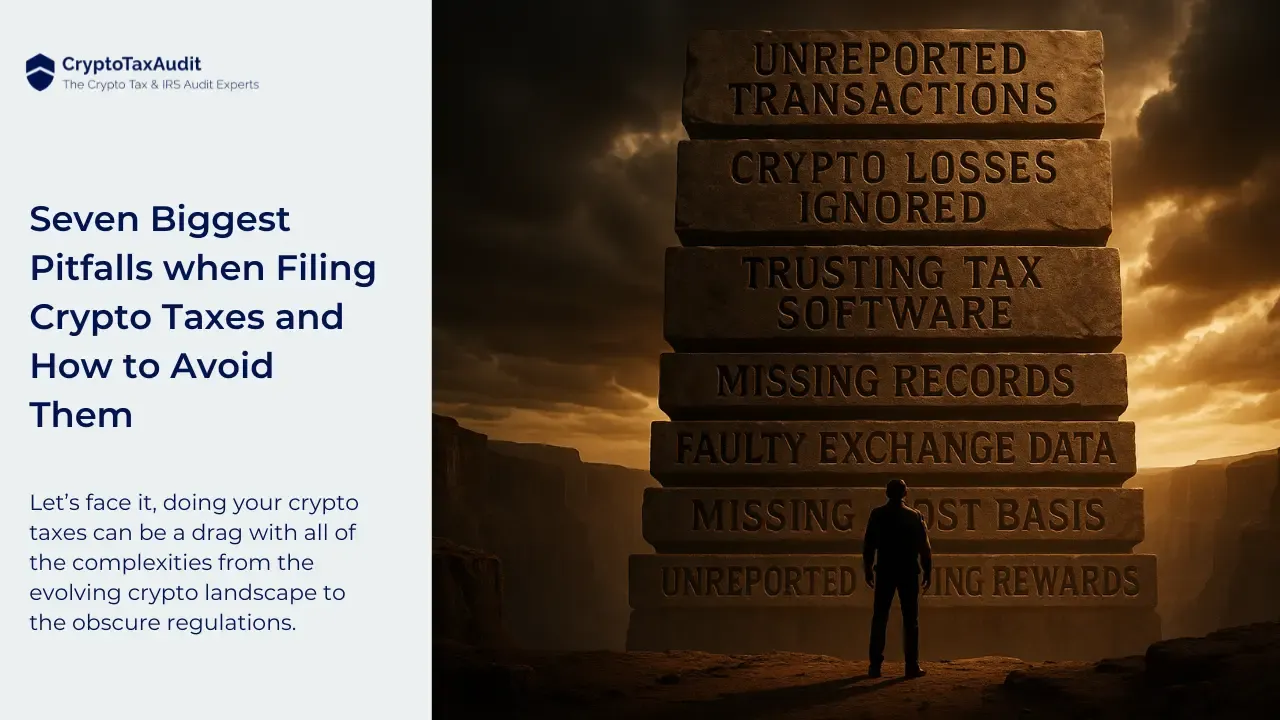
It's best to protect your crypto investments from hacks and scams. However, if they are lost or stolen, you can claim various tax deductions. Learn about different types of investing losses and how to claim them properly on your tax return. (TCDS-10)
Protect your cryptos.
There are lots of hacks and scams in the world of cryptos. It's best to take the steps to avoid being taken. But, if you do suffer a loss, there may be a silver lining when it comes to taxes. That silver lining is the ability to claim tax deductions for the losses you incurred.
Types of investing losses.
There are many types of investing losses. Let's take a loss at capital losses, worthless securities, and theft losses today.
Capital losses.
You are considered to have a capital loss when your losses for the year are more than your gains. That results in a net loss for the year, a capital loss. Tax laws limit the amount that you can reduce your adjusted gross income each year. For capital losses, the limit is $3,000.
For example, if your loss was $50,000 for the year, then you can take $3,000 reduction on your income this year. The remaining $47,000 is "carried over" to the next year, allowing you to start the next year with a $47,000 loss. That means the first $47,000 you make in capital gains next year becomes tax free! Although, in this case, you can't take the full benefit in the year you incurred the loss, it can help you in future years when you have gains to offset your past losses.
Worthless securities.
Another type of loss is a worthless securities loss. In this case, the IRS applies securities laws to crypto. It works by asserting that you bought something that is now worthless, typically because the project is now dead.
For example, the Terra USDT and LUNA coins lost virtually 100% of their value overnight. You could write that off that loss as though it sold for $0 on the last day of the year. You could then treat it as a capital loss.
Theft losses.
A third type of loss that affects investors is a theft loss. A theft Loss is interesting because it is claimed as an item in your itemized deductions. If you itemize your deductions, then you can claim theft losses for your losing investments.
I should mention that I'm talking about investments. I have read that on certain crypto tax gain calculations service sites that you can't claim cryptos in a theft loss. There is confusion with some people because Congress created a law that stated that your personal casualty losses could not be deducted. It was created as a special rule in 2018 and was valid for eight years.
People often make that mistake since they don't understand Section 165(H)(3) of the tax code which says that this provision applies only to personal assets and not to transactions that are entered into for profit. But, all crypto investment entered into for profit!
Therefore, you can normally take a theft loss on crypto. You can claim the amount you invested, but you cannot claim what the market value may have been, artificially or otherwise, at the time of your loss.
Proving theft losses.
The difficulty with a theft loss is you have to prove two things. First, you have to prove it was taken from you. Second, you have to prove that it was taken with criminal intent.
First, you have to prove it was taken from you. Second, you have to prove that it was taken with criminal intent.
If you get hacked, it can be hard to prove. You could say that you had the coins before and now they're not there. You could show the transactions that show the coins moving out of your wallet. That's one of the benefits of the blockchain. But, you can't necessarily prove that those actions were done with criminal intent because you don't know who did it.
In this case, it may be difficult or impossible to meet the the threshold of proof to claim it as a theft loss. If so, you can still claim it as a capital loss.
The Madoff procedure.
Now it's time for the exciting news. Back in 2008, an investment scandal occurred with an investment fund managed by Bernie Madoff. Tens of thousands of people were involved in his investment scheme and it brought to light the difficulty of claiming a theft loss on investments. The investments in this fund were large and there were a lot of wealthy people who had clout in Congress to push for a regulatory change.
So, after the nudge by the elite, the IRS came up with what we now call the Madoff procedure. It is officially IRS revenue procedure 2009-20, amended by 2011-58. This procedure made it easier to prove a theft loss by creating a "safe harbor". A safe harbor means that if you follow certain steps then the IRS is not going to contest your claim if you are audited.
How do you prove theft?
As I stated earlier, first you have to prove it was taken from you. You don't have to wait on a statement from the collapsed FTX exchange (a statement that may never come) that shows your original deposit amount and the now-missing balance.
You can show the transfer from another exchange into your FTX wallet. The proof of that transaction is satisfactory to prove that you deposited the funds. Then you can claim that the funds were lost or stolen because the exchange halted operation.
For example, let's say you bought a bitcoin at one exchange for $5,000 and then transferred it into your FTX exchange wallet when it was $25,000. When the exchange shut down and the value of bitcoin was $20,000 at the time, then you can claim a loss at the price at which it entered into FTX. That's $25,000.
How do you prove criminal intent?
Secondly, you need to prove that is was taken with criminal intent. This is where the benefit of the safe harbor makes it much easier to prove. All you have to do is show that there was an indictment at either the federal or state level, whether civil or criminal, against the promoter of the fraud. In the original case, the promoter was Bernie Madoff. In the case of FTX, the promoter was Sam Bankman-Fried (SBF). Both were indicted on federal criminal charges allowing all those investors who invested in their schemes to claim theft losses on their tax returns.
Note that the safe harbor does not require the promoter to be convicted, just indicted.
Downstream impact.
There's even more downstream impact with SBF. With Bernie Madoff, all he did was affect his own investment fund. But with SBF, he apparently touched a lot of other people and organizations. There are allegations that he received money under fraudulent pretexts, that he falsely represented to people what he would invest in, and that he falsely represented these facts to companies that he invested in directly or through FTX businesses, such as FTX Ventures, FTX US, or Alameda Research.
BlockFi losses may qualify.
One such company is BlockFi. SBF is accused of falsely representing the money he had invested in the company. Specifically, when BlockFi was in hard times, they received a $250M funding guarantee from FTX. But, it seems that FTX didn't have the money to lend. It was illusionary and they were deceived by SBF. This caused BlockFi to file for bankruptcy.
There appears to be criminal fraud involved in this case, even if it is indirect. Sam Bankman-Fried was a promoter of BlockFi because he invested in BlockFi, that he falsely represented his investment, and he gave false assurances to the people who trusted BlockFi with their assets. The IRS might want to argue about this indirect relationship, but I think it qualifies for the Madoff provision. (This is not tax advice, but rather my educated commentary for your consideration. Discuss your specific tax matters with your tax preparer or attorney, or contact CryptoTaxAudit for more information.)
In short, I believe virtually everything that FTX and SBF touched or invested in could be eligible for the Madoff procedure.
Celsius Network losses.
In another indictment in the crypto space, the State of New York filed a civil indictment on Alex Mashinsky shortly after the Celsius Network closed down.
That means if you had assets tied up in Celsius, you can now claim the Madoff procedure.
Tax software is limited.
Regarding the Madoff treatment, I have found that a lot of tax software does not support the forms necessary to do this. For example, TurboTax or H&R Block does not support it. If you talk to their teams, they may even say that you're silly for asking. Many solo tax practitioners use less expensive tax software that doesn't support this procedure either.
A Madoff procedure example.
Let's say you had a $100,000 of coins on FTX when it closed down. Since it is closed and the website is not functioning, you can't access them (or your FTX trading records). Typically, in bankruptcy proceedings, you cannot claim a loss until the judge disposes of the assets. That is, the assets are in limbo. They may even be in limbo for several years.
With the Madoff procedure, you can process your loss in the current tax year. Note that this treatment is sometimes called the Ponzi scheme treatment. The procedure is not necessarily limited to Ponzi schemes, though. You can claim theft losses for similar types of financial fraud by itemizing your deductions.
Another crypto example.
I filed a theft loss for a client a few years ago who had invested in a crypto mining operation that had monthly charges. She invested over $140,000 into the operation. In the same year, her adjusted gross income was $90,000. When the mining operation turned out to be a scam, she lost her entire investment.
In calculating her taxes, we were able to add $140,000 to her itemized deductions. This reduced her taxable income to zero, so she didn't owe any taxes that year. She also had $50,000 left over as a net operating loss that rolled into the following year. So, she started off the new year as though she had lost $50,000 of income.
Although it's sad when any loss happens, at least there is a silver lining: you can claim your loss!
Claim all your losses.
I recommend that you claim all of your losses on your tax return each year.
Here's another story: A man called our office in 2020 saying that he made a lot of money in crypto. He was really concerned because he had just made a million dollars trading! Rather than being excited about his gains, though, he was worried about the taxes.
As a new client, I asked him to tell me about what he did in the previous years. He responded that he had lost money investing in 2018 and 2019. He had lost $400,000 trading in 2018 and $600,000 in 2019. He hadn't reported it because he didn't want his wife to find out when she reviewed the tax return.
I told him that I had great news for him. We were going to go back and amend his 2018 and 2019 tax returns and claim all his losses. Although $3,000 is the maximum he could claim on his 2018 and 2019 amended tax returns, the rest of it rolled over. That was a total of $994,000 to roll over.
Since he had $1,000,000 in gains in 2020 and $994,000 of carry-forward losses, he didn't have to pay any taxes at all that year. He was floored, and grateful!
A lesson in winning and losing.
Whether you are winning or losing in the game of cryptocurrency investing, be sure to claim and document all your gains and all your losses. The gains are great, but there's a silver lining when it comes to your losses. They can help you to reduce your taxes.
DISCLAIMER: Opinions and perspectives of the author, host, and guests. It should not be construed as U.S. taxpayer advice. There are often multiple interpretations of tax law. Various strategies may be suited to specific individuals and for particular situations. Seek out professional tax, legal, or financial advice from CryptoTaxAudit or from other reputable companies.





